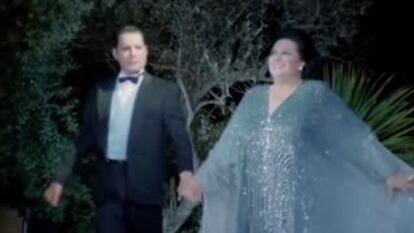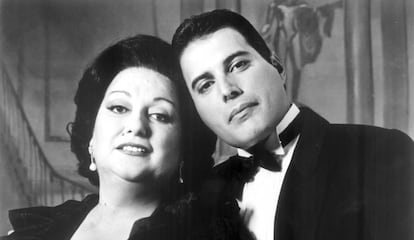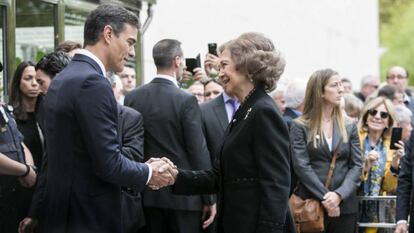How Freddie Mercury and Montserrat Caballé made musical history
The lead singer of Queen and the Spanish soprano, who died on Saturday aged 85, wowed the music world with their duet ‘Barcelona’

Without warning, he sat down at the piano at the former Hotel Ritz in Barcelona and began to improvise Exercises in Free Love, singing in falsetto what would be her part if she accepted. It was the beginning of 1987 and the first time Queen front man Freddie Mercury met Spanish soprano Montserrat Caballé. This meeting would lead to a legendary musical partnership that would bring the best of the classical and contemporary music world together in the iconic anthem Barcelona, written ahead of the 1992 Barcelona Olympic Games.
I was moved because we were creating something very special
Soprano Montserrat Caballé
Mercury had been a huge admirer of Caballé since he saw her perform in Verdi’s Un ballo in Maschera at the London Royal Opera House in 1983. In public, Mercury would state that his favorite singer was “Montsy,” a special way he had of pronouncing Caballé’s first name. The Queen vocalist sent endless messages to the opera star via her representatives, asking if they could meet and perform together. The song Exercises in Free Love was his way in.
Caballé liked that Mercury, contrary to appearances, sold his voice instead of his image. “When he sat down at the piano to improvise, I realized that a true musician was before me,” she said. He made such a good impression that she agreed to meet him again at his house in London to record a demo.
The iconic song Barcelona was born out of the music and lyrics by Mercury and his producer Mike Habiten. The theme of the song was no coincidence. The soprano had been tasked by the then mayor of Barcelona, Pasqual Maragall, with performing at the opening ceremony of the Olympic Games, perhaps singing the anthem. But it was Caballé’s own brother Carles who suggested she sing at the Olympics with Mercury.

That day in London they worked until 6am to record the demo of Barcelona. Needless to say, both the mayor and the International Olympic Committee were stunned by the result. But the miracle of the musical powerhouse was less technical than emotional. Mercury would say later that although they were worried about whether their different voices and registers “would go together,” it was not at all difficult because of, as she put it, the “feeling that emerged.” Caballé, a strong-willed but very human woman, was fascinated by Mercury’s “simple character,” “nothing at all like what you see when he’s on the stage singing with Queen.”
They were also linked by their religious faith, even though Mercury believed in Zoroastrianism. “I am a believer and he spoke about God and told me, ‘It doesn’t matter what path or name he takes, there is only one God.’ And I agreed,” the opera star recalled years later.
Mercury died eight months before the opening ceremony
The musical chemistry between Mercury and Caballé pushed Barcelona to the eighth spot on the UK charts in 1987 and was the inspiration for an album that took more than 18 months to complete, in part because of their conflicting artistic schedules, but mostly because Mercury was beginning to suffer the effects of AIDS.
“He told me [about his illness],” the soprano said in an old interview with Spanish news agency EFE. “Then we had the opportunity to create songs that all have a meaning … I was moved because we were creating something very special. It’s not often, you don’t often have the good fortune to sing with someone who is leaving, who knows it and to be singing with him his final goodbye.”
Caballé kept silent about Mercury’s illness, which brought them even closer. But the illness did not stop them from singing together on a number of occasions, most notably a special promotional performance of Barcelona at the nightclub Ku in Ibiza on May, 1987, ahead of the Olympic Games.
Mercury died eight months before the opening ceremony and was unable to sing Barcelona with Caballé at the special event. Instead she sang Amigos para siempre (Friends forever) with Spanish tenor José Carreras.
But a recording of Barcelona was played at the start of the international broadcast of the Olympic opening ceremony, pushing it to second place on the UK charts in 1992. The unlikely but powerful chemistry between Mercury and Montsy (“thanks to me she has become a rocker,” the Queen star joked), left a musical masterpiece that will outlive them both.
Caballé died on Saturday, October 6, 2018 from a gall bladder infection at the age of 85.
Farewell to the “best ambassador for Catalan and Spanish culture”

Family members, friends, politicians and personalities from the world of culture paid their respects on Monday to the Spanish soprano Montserrat Caballé, who died on Saturday at the age of 85 in Barcelona’s Sant Pau Hospital.
After the funeral service, which was held at the Les Corts tanatory in the Catalan capital, the singer was due to be buried next to her parents in the Sant Andreu de Barcelona cemetery.
Spanish Prime Minister Pedro Sánchez was present at the funeral along with Culture Minister José Guirao. Also there was Spain’s Queen Sofía, the Catalan regional premier Quim Torra, and the leader of the conservative Popular Party (PP), Pablo Casado, who paid tribute to Caballé as being the “best ambassador for Catalan and Spanish culture.”
English version by Melissa Kitson.
Tu suscripción se está usando en otro dispositivo
¿Quieres añadir otro usuario a tu suscripción?
Si continúas leyendo en este dispositivo, no se podrá leer en el otro.
FlechaTu suscripción se está usando en otro dispositivo y solo puedes acceder a EL PAÍS desde un dispositivo a la vez.
Si quieres compartir tu cuenta, cambia tu suscripción a la modalidad Premium, así podrás añadir otro usuario. Cada uno accederá con su propia cuenta de email, lo que os permitirá personalizar vuestra experiencia en EL PAÍS.
¿Tienes una suscripción de empresa? Accede aquí para contratar más cuentas.
En el caso de no saber quién está usando tu cuenta, te recomendamos cambiar tu contraseña aquí.
Si decides continuar compartiendo tu cuenta, este mensaje se mostrará en tu dispositivo y en el de la otra persona que está usando tu cuenta de forma indefinida, afectando a tu experiencia de lectura. Puedes consultar aquí los términos y condiciones de la suscripción digital.









































